| |
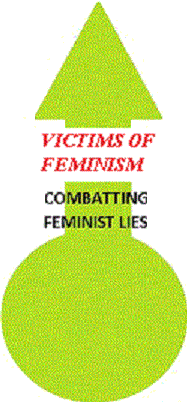
|
Empowering Men:
|
TVNZ Enslaves Men (five times
updated and slightly edited)
Peter Zohrab 2019-2020 |
|
|
(Open Letter to Television New Zealand)
Dear sir/Madam,
Official Information Request
The point of this story is not clear, since TVNZ appears to be criticizing
the Law Society for requiring women to wear cocktail dresses at a
function – yet TVNZ does not appear to find anything wrong with
women being allowed to wear cocktail dresses at that function, if
they happen to want to. So TVNZ seems to be pushing its usual line
that whatever women want to do is alright, but women must never be
asked by men to do anything, even if the women wanted to do that anyway!
I have a Diploma of Journalism, so I know that news items are supposed
to be chosen on the basis of their supposed “newsworthiness,”
rather than on the basis of a political agenda which journalists want
to pursue.
Under the Official Information Act, could you please answer the
following questions:
-
What factors led to your decision to run that story?
-
What factors led to your decision to use a headline which emphasized
that the Law Society was being attacked, rather than headlining
the nature of its dress-code? For example, your headline could
have been: “NZ Law Society’s dress code, in comparison
with barristers’ dress code and TVNZ’s dress code.”
-
The reason that you ran the story was apparently that one individual,
Mark Ford, put it on social media. How many other individual people
had you seen on social media complaining about separate issues
on that day, without you bothering to run stories about them?
-
How many times have you reported the views of Men’s Rights
Activists on Feminist issues as a headline? (The above is obviously
a Feminist issue, which therefore is also a Men’s Rights
issue).
-
How many times have you asked me to comment on a Feminist issue?
(I note that you are very well aware of my existence, since you
have interviewed me – but never as a commentator on Feminist
issues which you reported the views of Feminists about).
-
How many times have you asked other Men’s Rights Activists
to comment on a Feminist issue? (Never, as far as I am aware).
-
Does your treatment of this issue indicate that you agree with
the criticism of the Law Society’s dress code?
-
As a Government-owned organization, is it a proper function
of TVNZ to censor views that it disagrees with and to proactively
push certain socio-political agendas?
-
Is the newsworthiness issue involved in this story the fact
that female lawyers would be wearing party dresses, or that men
might have some part in deciding what they would be wearing?
-
In the view of your staff who created the news item, has the
issue been resolved by your story’s final sentence, which
was,
“As for the Law Society's anniversary dinner, attendees
are now being told to wear whatever they like”?
-
In other words, is it alright if women wear sexy clothing –
as long as they decide individually to do so? Your news item did
not discuss that issue.
-
Your news story features a photograph of your reporter talking
to a woman (presumably from TVNZ’s own costume department)
who is holding what presumably is a cocktail dress and the two
women are looking archly and knowingly at each other. Can you
please confirm that what is special about cocktail dresses, in
your view, is that they expose a lot of skin – specifically
cleavage?
-
Can you confirm that you think that men generally like looking
at women’s skin – especially cleavage?
-
Can you confirm that you think that it was wrong of the Law
Society to ask women to wear cocktail dresses, because that would
attract men and give them pleasure?
-
Judging by your article’s final sentence, TVNZ thinks
that it is alright for women to choose to wear clothing that attracts
men and give them pleasure – but not for men to play any
part in the decision whether they wear that clothing. Is that
true?
-
Are men’s “everyday business suits” less sexy
than more formal attire, such as dinner-jackets? If so, why?
-
Why does TVNZ think that it is alright for women to expose more
skin (especially in the chest area) than men do when working as
newsreaders, or in other office or work or formal situations?
-
Do female TVNZ presenters who show their cleavage, or even more
of their breasts, get some exhibitionist pleasure out of doing
this?
-
Why is it that female presenters on the 6:00 PM News are generally
well covered-up, but female presenters on Breakfast often show
their cleavages, or even more of their breasts. Part of the reason
may be that the main weekday female presenter has an unattractive
chest, which is seldom exposed. For example, I have noticed exhibitionist
behaviour on the part of Melissa Stokes, when she appears on Breakfast,
whereas she is usually very conservative in her dress and behaviour
when presenting the 6:00 PM News at weekends. For example, on
Breakfast, I once saw her bounce hard onto her chair, when sitting,
down, which made her breasts bounce visibly.
-
The TVNZ attitude to cocktail dresses makes it clear that the
purpose of cocktail dresses is to attract men, who are then forced
(in most cases) to make the first move. I myself experienced this
traumatically as a young adolescent, when I was rejected by a
girl purely for failing to make a move when she clearly (in retrospect)
expected me to make a move. And now the #MeToo movement is treated
by TVNZ as Gospel. TVNZ has never allowed any Men’s Rights
Activist to comment on the #MeToo movement on-screen. The #MeToo
movement treats any overt move by a man as a potential sexual
assault – even though the woman might have provoked that
move by her dress or behavior.
-
Is TVNZ deliberately pursuing a policy of enslaving men?
|
In due course, I received the following reply:
|
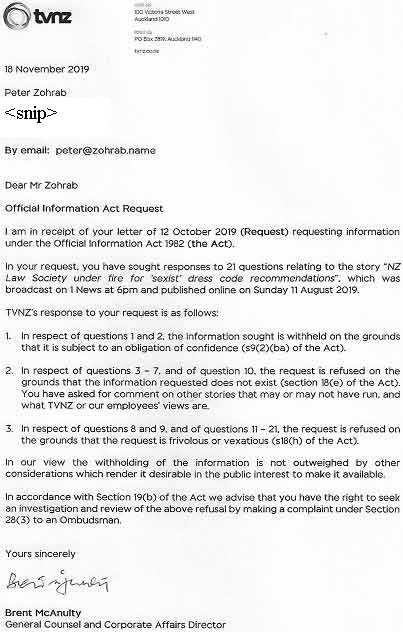 |
On 27th November 2019, I wrote to the Ombudsman as follows:
|
Dear sir/Madam,
Could you please investigate and review TVNZ's refusal (in the forwarded
email below) to answer any of my Official Information Act questions?
Thank you in advance.
Yours sincerely,
Peter Zohrab |
In due course, I received the following reply
from the Ombudsman:
|
 |
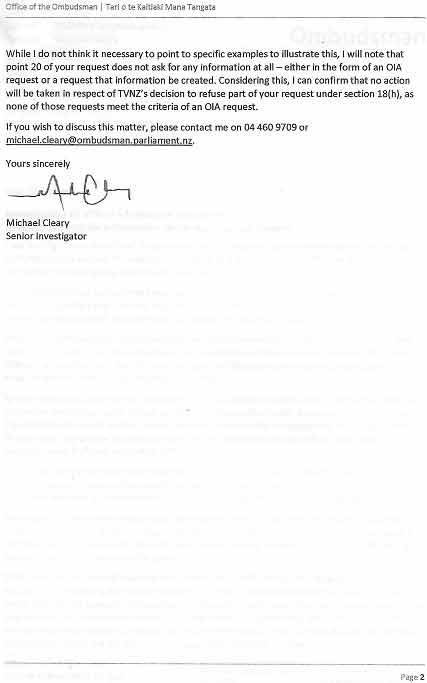 |
I replied as follows:
|
23 February 2020
Michael Cleary
Senior Investigator
Ombudsman’s Office
michael.cleary@ombudsman.parliament.nz
Dear Mr. Cleary,
In your letter dated 21 February 2020 you state:
Before an Ombudsman would consider a complaint of this nature,
the complainant would need to set out why they consider this information
is held by the agency.
Television New Zealand is not a Government department, which (certainly
in my experience) is the usual target of an Official Information request.
Since it is a media organization, the kind of information which it holds
is different from that which is typically held by a Government department.
Television New Zealand decided to produce that item and its reasons
for doing so constitute Official Information.
I now set out why I consider that the relevant information is held
by Television New Zealand – question-by-question, from Question
3 onwards.
3. It is obvious that Television New Zealand holds information about
(at least approximately) how many other individual people its staff
had seen on social media complaining about separate issues on that day,
without bothering to run stories about them – unless it had discarded
that information. Its computer system is presumably monitored by IT
staff for such web browsing issues as legal and illegal pornography
being downloaded and so on.
4. Obviously, Television New Zealand must have an archive which is
indexed and which therefore contains information such as how many times
it has reported the views of Men’s Rights Activists on Feminist
issues as a headline.
5. On my Question 5, you comment as follows:
You appear to have responded to your own request, and it is
not clear why you are disputing TVNZ’s decision on it, given
you appear to already know that it has not interviewed you about a
‘Feminist issue’, then it is not clear why you are complaining
about its decision on it. We would welcome your clarification on this
point.
I understand why you made that comment. However, the point is not
what I myself know. I know how many times TVNZ has asked me to comment
on a Feminist issue (zero times), but my question was what their records
showed as to how many times TVNZ has asked me to comment on a Feminist
issue. In a previous Official Information Act matter (see: min4men.html#om241219),
you forced me to accept an answer from the Minister of State Services
which was (to my mind) completely off-topic, on the grounds that my
complaint was with the quality of the official information provided
– not with whether the information had been provided.
Therefore, in this case, I don’t see how you can simply assume
that the information which they would hold on this would be the same
as I myself hold (in my head). The quality of their information on such
topics may be poor, for all I know. Once I know what their information
on this issue is, I will be in a position to follow this issue up with
them at some point in the future.
6. I don’t see how you could possibly deny that asking “How
many times have you asked other Men’s Rights Activists to comment
on a Feminist issue?” is a request for Official Information. As
I stated above, I am sure that Television New Zealand has archives.
7. Similarly, I think that Television New Zealand definitely has Official
Information on this topic. It must know the ideological mindset of the
Producer of that programme with respect to the issues involved in the
item which the Producer decided to create.
8. This is an extremely important issue, on which Television New Zealand
must have information as to its views and practices. None of my questions
are frivolous. They may well be vexatious to Television New Zealand,
because it is a vicious organization which is always seeking to oppress
men and does not want to be subject to the Official Information Act.
9. I have a Diploma of Journalism. Newsworthiness is a key journalistic
value and Television New Zealand certainly has information as to what
the newsworthiness of this item was that caused it to produce it.
10. Television New Zealand decided to create this item and the point
of this question is to get some insight into why it did so. Obviously,
Television New Zealand must know why it produced it and finished it
in that manner.
11. This question has the same sort of aim as the previous one.
12. The item made a big issue of cocktail dresses, so Television New
Zealand must know why it did so.
13. This question follows on from the previous one.
14. This question also follows on.
15. This question also follows on.
16. This question also seeks to discover Television New Zealand’s
reasons for producing the item in question.
17-21. These questions aim to discover what Television New Zealand’s
policies are with respect to the issues raised in the news item in the
context of its own workplace. It is obvious that Television New Zealand
must have a dress code. As you point out, Question 20 is not a question.
It is merely a preliminary statement to Question 21 and they should
have been merged into one single question.
Your ruling out of most of my questions as being frivolous or vexatious
is nothing short of Fascist censorship. You provided no detail, because
you have absolutely no case and are simply colluding with Television
New Zealand on political grounds. You focused on Question 20, although
it is clearly not frivolous or vexations, but simply a mistake and not
an actual question.
Yours sincerely,
Peter Zohrab
|
In due course, I received the following reply from the
Ombudsman:
|
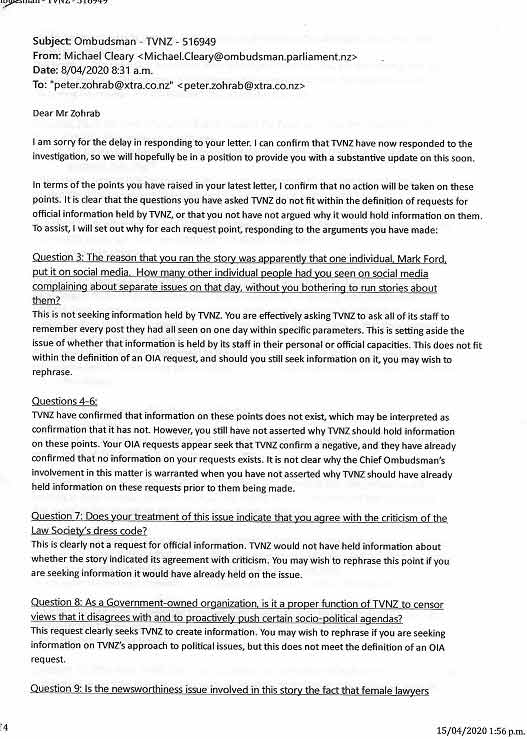 |
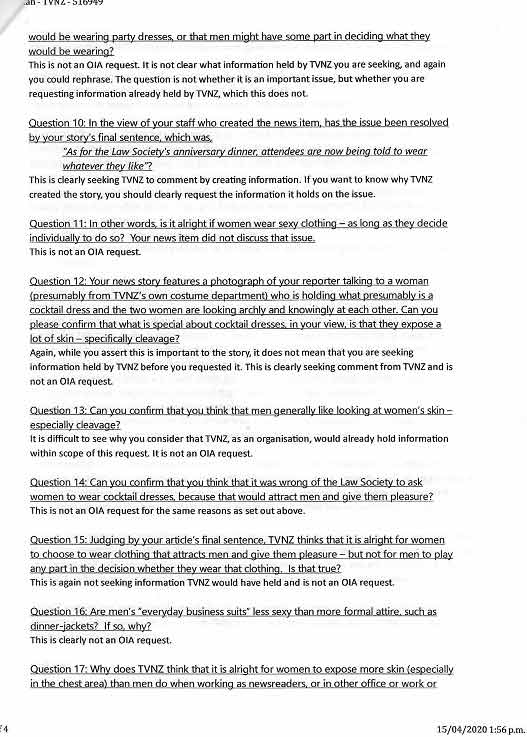 |
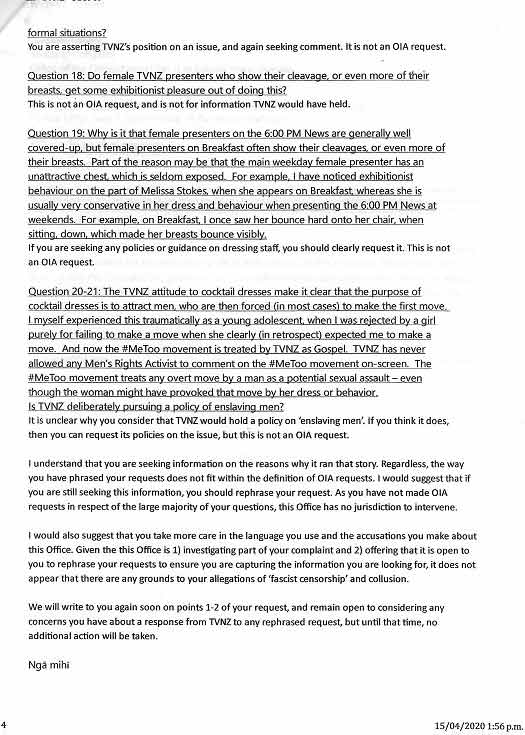 |
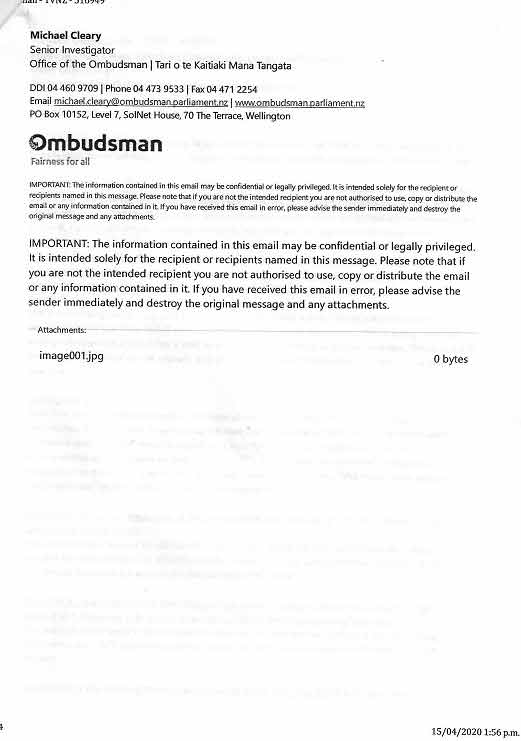 |
I did not immediately follow up on the above letter.
Later, I received the following reply from TVNZ:
|
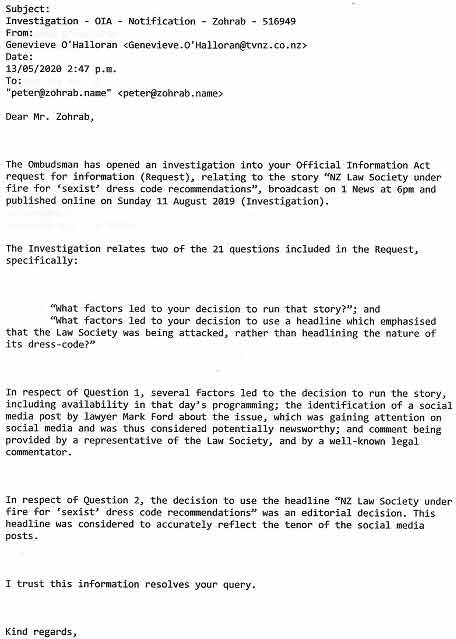 |
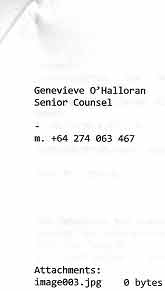 |
I did not immediately follow up on the above letter either.
Later, I received the following further letter from the Ombudsman:
|
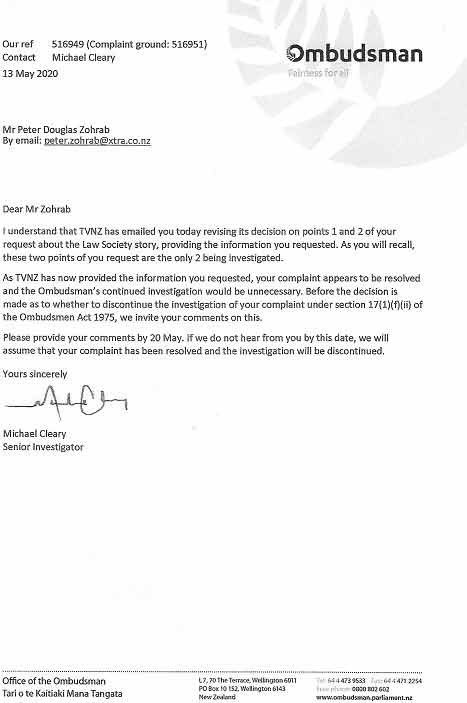 |
I did not immediately follow up on the above letter either.
Later, I received the following further letter from the Ombudsman:
|
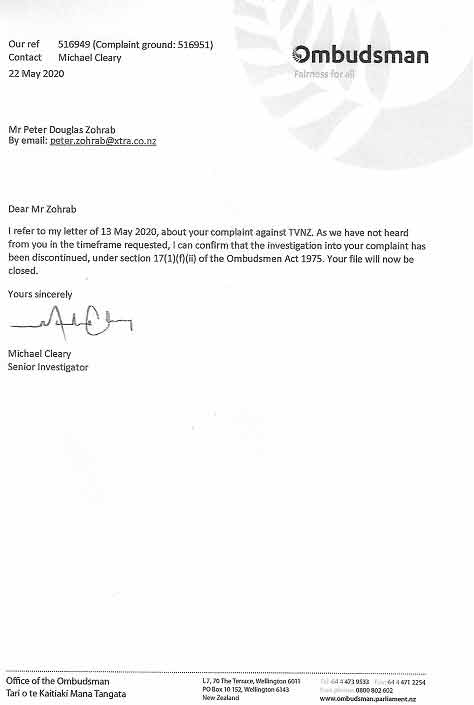 |
To date, I have not taken any further action on the above letters.
|
|
See also:
|
| |
Webmaster |
|
Latest Update |
15 July 2022 |
|
|
|











